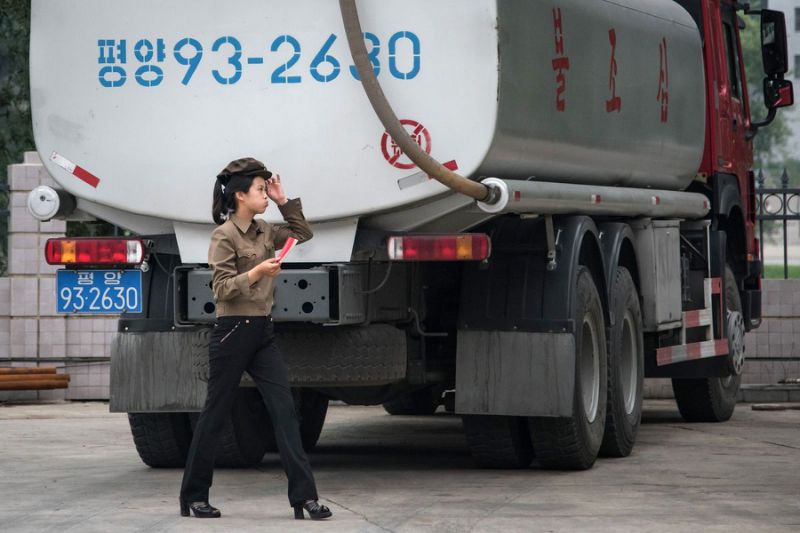Media Report

- Bloomberg reports: "China has signaled it's ready to back another round of United Nations sanctions that will slash exports of fuel to North Korea, according to people familiar with the matter. The UN Security Council is set to vote on Friday at 1 p.m. in New York on the fourth resolution against North Korea in 13 months. It comes in response to a Nov. 28 missile test that leader Kim Jong Un said proved he could deliver a nuclear bomb to the U.S. If approved, the resolution would cut deliveries of petroleum products, including diesel and kerosene, by almost 90 percent, to the equivalent of 500,000 barrels. That's a further reduction from a September resolution that reduced petroleum product sales to 2 million barrels annually starting Oct. 1, down from 4.5 million barrels. The new resolution would also cap crude imports at current levels of about 4 million barrels annually. China, North Korea's largest trading partner and a veto-wielding member of the Security Council, has said it will support the resolution, according to a Security Council diplomat. An EU ambassador to the Security Council also said he was 'confident' China would vote in favor. Both asked not to be identified because the discussions are private. China's foreign ministry didn't immediately respond to faxed questions."
- CNBC reports: "China's continents-spanning Belt and Road network threatens to 'shackle' partner countries and deprive them of valuable natural assets, according to one critic. Beijing is financing and executing massive infrastructure projects across the 68 nations participating in the ambitious scheme, which snakes along Europe, the Middle East and Asia. These recipient countries, many of them emerging economies in dire need of investment, obtain funding in various forms such as sovereign loans from Chinese President Xi Jinping's administration and credit from Chinese state-owned banks. But concerns of developing countries taking on unrealistic financial obligations have sparked allegations of what's being called 'dept-trap diplomacy'... 'Just as European imperial powers employed gunboat diplomacy, China is using sovereign debt to bend other states to its will,' according to Brahma Chellaney, professor of strategic studies at the New Delhi-based Center for Policy Research, who described Beijing's policies as 'creditor imperialism'... Supporters of Belt and Road say fears of China's geopolitical intentions are overblown, and point to the venture's vast economic potential instead. The program 'could function much like America's post-1945 Marshall Plan, which is universally lauded for its contribution to the reconstruction and economic recovery of war-ravaged Europe,' wrote Shang-Jin Wei, a Columbia University professor."
- CFR comments: "The recent spate of articles and books on rising Chinese influence in the Australian and New Zealand political systems has prompted U.S. officials, journalists, and others to take a harder look at how Beijing is shaping U.S. policy toward China. Already there have been articles in the press suggesting that university and think tank scholars are likely targets for Chinese influence. Yet before any steps are taken to counter this perceived influence, we need to spend time understanding the nature and implications of what the Chinese government is doing to ensure not only that we get the response right but also that we protect against a witch hunt in which American scholars and analysts are attacked with innuendo instead of real evidence... While the United States seeks to understand and curtail opportunities for the Chinese government to influence U.S. political discourse through think tank and university scholars, it should ensure that facts trump rumors and avoid overreacting. In the current divisive and amped-up U.S. political environment, there is significant danger that educational institutions, think tanks, and scholars will be caught up in a rush to root out Chinese influence."
Calendar
- 2017-12-21 Trump and China: 2018 could get nasty
- 2017-12-20 China Shrugs Off Debt Worries as Xi Takes Firmer Economic Grip
- 2017-12-19 China says Trump's new security policy shows 'Cold War mentality'
- 2017-12-18 Trump National Security Strategy Sees U.S. Confronting China and Russia
- 2017-12-17 Trade tussle with China tests the global system
- 2017-12-15 China Is Still Building on Disputed Islands in the South China Sea
- 2017-12-14 China’s ‘long arm’ of influence stretches ever further
- 2017-12-13 Tillerson's new North Korea strategy praised by China and Russia — but undermined by Trump
- 2017-12-12 Why China Won't Cut Off North Korea’s Oil Lifeline
- 2017-12-11 China volatility darkens 2018 investment outlook
News
- Bloomberg China to Back Fresh UN Sanctions on North Korea Fuel
- CNBC China's using cheap debt to 'bend other countries to its will,' academic says
- The Diplomat China Takes Bigger Role in Palestine-Israel Issue as UN Rejects Trump's Jerusalem Move
- Bloomberg China Bans South Korean Tour Groups, Say Travel Agencies
- BBC France couple in China unreachable after Liu Xiaobo tribute
- Reuters China considers punishing those who slander heroes and martyrs
- Voice Of America China Gears Up to Reduce Impact of US Tax Cut
- Quartz China's real-life magic realism of 2017, according to Chinese netizens
- CNBC From China to Singapore, Asian countries are increasingly uneasy with the rise of bitcoin
- Quartz China's sharing bubble has produced the Chinese character of the year
- ABC News India, China hold talks on long-running border dispute
- Financial Times China's 'pigless villages' tame volatile pork cycle
- ABC News Anger with China drives Uighurs to Syria fight
Commentary
- CFR Beware Chinese Influence but Be Wary of a China Witch Hunt
- Miami Herald China is eating America's lunch in Latin America — and Trump is helping
- Environmental Defense Fund 5 things to know as China launches the world's largest carbon market
- The National Interest China Is Gaining Control of the South China Sea (Thanks to North Korea)
- Forbes China Is Giving More Foreign Aid Than It Gets
- Wired Behind the Fall and Rise of China's Xiaomi
- Financial Times Can Russia help China crack ice hockey?
- Bloomberg China's Clever Tax Solution
